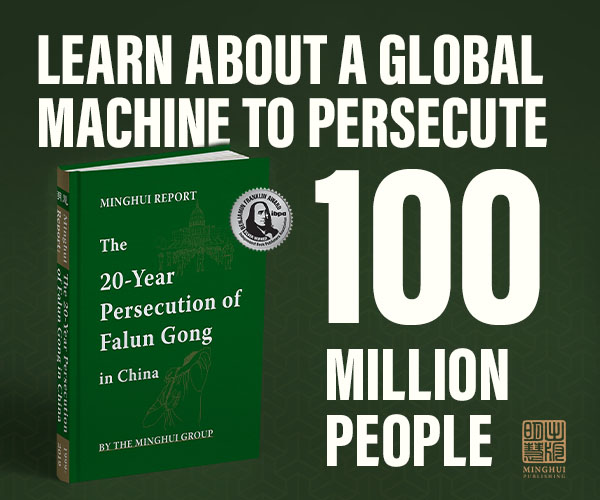(Minghui.org) I grew up with Chinese traditional values and witnessed how the Chinese Communist Party ruined those values and corrupted people’s minds over the years. I was also fortunate to experience the uplifting of morality following Falun Dafa’s public introduction, when its practitioners strove to live by Falun Dafa’s principles of Truthfulness-Compassion-Forbearance.
Traditional Values Deeply-Rooted in Hearts of Older Generations
I was born in a farm village in the 1970s. Despite the poor living conditions, people were kind back then. My grandparents often told me stories of good being rewarded and evil punished. I was fascinated by those stories, which sowed the seeds of kindness in my heart.
People were respectful of generation ranks at that time. Younger generations would never refer to people of older generations by their names. The former would always call the latter uncle, aunt, grandma, grandpa, etc., even if they were not related.
When a family needed help, the whole village would jump in and lend a hand. Some offered free labor, while others contributed money – the help was selfless and heartfelt.
Men and women were well aware of the boundary between the opposite sex, and they would blush when they first met each other. Divorce was rare, and it was a very shameful thing for anyone to have an improper relationship outside of the marriage.
Rarely did anyone borrow money and not pay it back.
The ten-year Cultural Revolution from 1966 to 1976 destroyed traditional culture and instilled a lot of falsehood, evilness, and fighting in people’s minds, but there were still a lot of traditional values in the minds of my grandparents’ generation, and they measured things by whether they “accumulated virtue” or “generated karma,” which left a deep impression on me.
Moral Depravity Follows Economic Reform and Opening Up of the Country
In the 1980s, the Chinese Communist Party began market reforms and opening up the country to foreign investment. Corrupted things from the West also came in, such as “sexual liberation” and “sexual freedom.” It was very difficult for us to accept it at that time, but such words appeared from time to time in books and magazines.
I remember clearly that in the late 1980s, a Taiwanese TV series that openly promoted pornography was shown on the Chinese Communist Party’s state-controlled TV station. One physical education teacher commended how good the TV series was. I was stunned: “I heard that this was a pornographic film, and how could the teacher still say it was good?”
Moral corruption quickly spread around the country and became worse when the CCP began to promote economic development in 1992. I was in college at the time. It felt to me that overnight, cheating on exams no longer needed cover-ups and bribing others to get things done suddenly became commonplace.
People felt that the most fashionable goal was to make money. And traditional culture and values were viewed as feudalistic superstitions that restricted people and should be discarded altogether.
Discovering a Pure Land
For people like me who grew up with traditional culture, it was painful to go with the flow. I struggled to find the truth of life. After all, why do people live? For the sake of petty gains in life? I felt helpless and hopeless each and every day.
Falun Dafa, a mind-body practice based on the principles of Truthfulness-Compassion-Forbearance, was introduced by Master Li Hongzhi to the public in May 1992, in Changchun City, Jilin Province. I attended Master’s Fa lecture series in Zhengzhou City, Henan Province in 1994. I made up my mind that I would abide by the principles of Falun Dafa and cultivate myself to be a good person. I cried on my way back to school, and it was tears of joy: “I have a Master!”
I strove to live by the principles of Truthfulness-Compassion-Forbearance from then on. I looked within whenever I encountered problems. I followed the course of nature and did not fight for power or profit. My classmates said that I turned into a dummy – they said if one did not fight for anything, what was the point of living?
Ordinary people don’t understand cultivators. But not fighting for things doesn’t mean one has nothing. I learned many heavenly secrets through practicing Falun Dafa, and the pursuit of a higher spiritual realm is a true joy for me. Material pursuits will only lead to greed and desire, and what it brings is nothing but suffering.
At that time, whenever Falun Dafa was mentioned in society, everyone spoke highly of it. Many companies specifically looked for workers who practiced Falun Dafa. Officials who practiced Dafa stopped corruption and bribery, and put the vital interests of the people first. Businessmen who practiced Dafa did business with integrity. There were simply too many examples of peoples’ hearts being rectified by the principles of Truthfulness-Compassion-Forbearance.
Learn the Truth and Choose a Bright Future
All this changed after July 20, 1999, when the Chinese Communist Party launched a genocidal persecution of Falun Dafa practitioners and flooded the airwaves with slanderous propaganda against the practice. The general public, who already had a good impression of Falun Dafa, became frightened of it, or even developed hatred towards the practice.
Morality further declined when Truthfulness-Compassion-Forbearance became taboo in the Chinese society. Corruption of officials and bribing became rampant; “one-night stands” and having extra-marital affairs were no longer shameful; and people dared to do anything for money.
As conflicts in society have become ever more intensified nowadays, many people now realize that corruption and material pursuit aren’t the solution to happiness. Only by rejecting the Chinese Communist Party, abandoning Party culture, and returning to traditional values, can we find happiness and embrace a bright future.
Views expressed in this article represent the author's own opinions or understandings. All content published on this website are copyrighted by Minghui.org. Minghui will produce compilations of its online content regularly and on special occasions.
Category: Perspective










